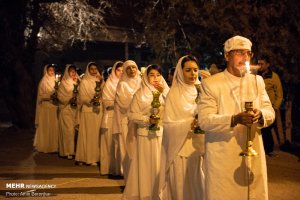Eight members of Iran’s banned Bahá’í community convicted for “disrupting national security” and “spreading anti-government propaganda” by practicing their faith have lost their judicial appeal aimed at delaying their imprisonment in a facility where they would risk exposure to the COVID-19 pandemic that has battered the country.

The eight Bahá’ís—six women and two men—received letters September 28 from an appeals court in Iran’s South Khorasan province, informing them that the court had rejected their petition for deferred incarceration, according to Voice of America (VOA).
The report quoted an Iran-based source familiar with the matter stating that the eight members of the minority faith had been summoned to report to a prison in the eastern city of Birjand, by October 10 or face arrest. The appellate court on September 8 upheld a lower court’s sentencing of the Bahá’ís to prison terms of 15 months to two years.
VOA reports Iranian state media did not cover any of the Bahá’í-related prison sentences or appeals.
Two of the women who were sentenced voluntarily reported to the Birjand prison on October 12. Several of the Bahá’ís who received the prison summons appealed to authorities to either delay the group’s imprisonment or to allow its members to serve their sentences at home, with electronic devices monitoring their movements.
The appellate court acquitted a ninth member of the community, Rahmatollah Dimi, and overturned his prison sentence because of his old age, the source said.
Meanwhile, Bahá’í Farid Zirgi Moghaddam, began serving his 5-year sentence in Birjand’s central prison on October 19, a Bahá’í persecution watchdog, Iran Press Watch, reported.
Moghaddam was sentenced in July 2020 to six years imprisonment—five years for “membership in the outlawed Bahá’í organization” and one year for “propaganda against the state.” In September, an appeals court overturned his conviction for “propaganda against the state” but upheld the 5-year sentence for membership.
Against the backdrop of the COVID-19 pandemic, Iran’s theocratic regime has faced international pressure to release Iranian prisoners of conscience instead of aggravating their long-standing religious persecution.
Tehran considers the Bahá’ís heretics and deprives them of religious and other liberties, in violation of the 1948 Universal Declaration of Human Rights. Although unofficial estimate of Iran’s Bahá’í population is more than 300,000, the only faiths the country’s constitution recognizes are Islam, Christianity, excluding those who convert from Islam, Judaism and Zoroastrianism.
In May 2020, a Revolutionary Court in the historic city of Shiraz sentenced seven Bahá’ís to a combined 33 years in prison, evoking memories of a 20-year sentence each handed down to seven other Bahá’ís in 2007 (later reduced to 10 years) on charges of “propaganda against the regime and membership in anti-regime groups.”
In July, Iranian security officials arrested eight converts to Christianity, three months after 16 other Christian converts were convicted for “propaganda activities against the regime through the formation of house churches.” The arrests brought to at least 34 the number of Christians arrested in the country so far in 2020.
In its 2020 annual report released in June, the United States Commission on International Religious Freedom, a bipartisan federal body that advises the U.S. State Department, listed Iran among 14 “countries of particular concern” for their “systematic, ongoing, and egregious” violations of religious freedom. Iran has been on the list consistently since 1999.
________________
From its beginnings, the Church of Scientology has recognized that freedom of religion is a fundamental human right. In a world where conflicts are often traceable to intolerance of others’ religious beliefs and practices, the Church has, for more than 50 years, made the preservation of religious liberty an overriding concern.
The Church publishes this blog to help create a better understanding of the freedom of religion and belief and provide news on religious freedom and issues affecting this freedom around the world.
The Founder of the Scientology religion is L. Ron Hubbard and Mr. David Miscavige is the religion’s ecclesiastical leader. For more information, visit the Scientology website or Scientology Network.


